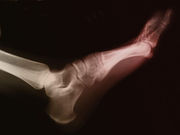Better off-loading predicted by larger and more severe DFUs, more severe neuropathy, foot pain
THURSDAY, June 9, 2016 (HealthDay News) — For patients with diabetic foot ulcers (DFUs), off-loading adherence is associated with healing, but postural instability is a powerful predictor of nonadherence, according to a study published online June 6 in Diabetes.
Ryan T. Crews, from the Rosalind Franklin University in Chicago, and colleagues conducted a prospective, multicenter study involving 79 patients (46 from the United Kingdom and 33 from the United States) with type 2 diabetes and plantar DFUs. DFUs were offloaded with a removable device, and the correlation between off-loading adherence and healing was assessed over a six-week period.
In multivariate analyses, the researchers found that smaller baseline DFU size, U.K. study site, and better off-loading adherence were predictors of smaller DFU size at six weeks (P < 0.05). Larger and more severe baseline DFUs and more severe neuropathy and Neuropathy and Foot Ulcer Quality of Life (NeuroQoL) foot pain predicted better off-loading adherence (P < 0.05). Worse off-loading adherence was predicted by greater NeuroQoL postural instability (P < 0.001). There was no correlation for the Hospital Anxiety and Depression Scale and Revised Illness Perception Questionnaire with off-loading adherence.
“Clinicians should take this neuropathic symptom into consideration when selecting an off-loading device, as off-loading-induced postural instability may further contribute to nonadherence,” the authors write.
One author disclosed financial ties to Össur Americas, which is a manufacturer of off-loading devices.
Full Text (subscription or payment may be required)
Copyright © 2016 HealthDay. All rights reserved.








